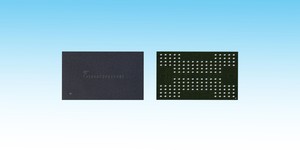Intel-Micron gives NAND some TLC
August 18, 2010 | 09:52
Companies: #intel #intel-micron-flash-technologies #lexar #micron

Intel's joint venture with Micron Technology appears to be bearing fruit at last, with the pair announcing the delivery of 3-bit-per-cell NAND flash memory based around a 25nm process - providing what the companies are claiming is the highest-density flash storage in the world.
Although not in full production, the pair have produced and shipped sample quantities of the memory to "select customers," with mass production slated for the end of the year - meaning that it will be 2011 at the earliest before we can get our grubby mitts on devices based on the new memory.
The 64Gb chips are initially aimed at USB flash drives, Secure Digital cards, and the euphemistically-named "consumer electronics market," with no mention of solid-state drives to be seen in the company's business plan.
The 3-bit-per-cell technology - also known as triple-level cell, or TLC - is the logical progression from the current single-level cell and multi-level cell memory used in current flash storage devices, and reduces the size of the chip by over 20 per cent when compared with current 25nm MLC-based flash memory - resulting in a 131mm² die set in a TSOP package for the 64Gb version.
This means that the chips are cheaper to produce, require less power, and can have higher capacities for the same surface area - all despite being based around the same 25nm process as the venture's existing MLC chips.
Tom Rampone, vice president of Intel's NAND Solutions Group, claims that Intel "plans to use the design and manufacturing leadership of [Intel-Micron Flash Technologies] to deliver higher-density, cost-competitive products to our customers based on the new 8GB TLC 25nm NAND device," although again neglects to mention SSDs.
The first companies likely to create products based around the new chips will be Lexar Media and Micron itself, who will be using the technology to produce higher-capacity SD cards for digital cameras.
Are you applauding Intel and Micron's work on higher-capacity NAND flash memory, or just amazed that there's no mention of bigger - or, better yet, cheaper - SSDs on the horizon? Share your thoughts over in the forums.
Although not in full production, the pair have produced and shipped sample quantities of the memory to "select customers," with mass production slated for the end of the year - meaning that it will be 2011 at the earliest before we can get our grubby mitts on devices based on the new memory.
The 64Gb chips are initially aimed at USB flash drives, Secure Digital cards, and the euphemistically-named "consumer electronics market," with no mention of solid-state drives to be seen in the company's business plan.
The 3-bit-per-cell technology - also known as triple-level cell, or TLC - is the logical progression from the current single-level cell and multi-level cell memory used in current flash storage devices, and reduces the size of the chip by over 20 per cent when compared with current 25nm MLC-based flash memory - resulting in a 131mm² die set in a TSOP package for the 64Gb version.
This means that the chips are cheaper to produce, require less power, and can have higher capacities for the same surface area - all despite being based around the same 25nm process as the venture's existing MLC chips.
Tom Rampone, vice president of Intel's NAND Solutions Group, claims that Intel "plans to use the design and manufacturing leadership of [Intel-Micron Flash Technologies] to deliver higher-density, cost-competitive products to our customers based on the new 8GB TLC 25nm NAND device," although again neglects to mention SSDs.
The first companies likely to create products based around the new chips will be Lexar Media and Micron itself, who will be using the technology to produce higher-capacity SD cards for digital cameras.
Are you applauding Intel and Micron's work on higher-capacity NAND flash memory, or just amazed that there's no mention of bigger - or, better yet, cheaper - SSDs on the horizon? Share your thoughts over in the forums.

MSI MPG Velox 100R Chassis Review
October 14 2021 | 15:04








Want to comment? Please log in.